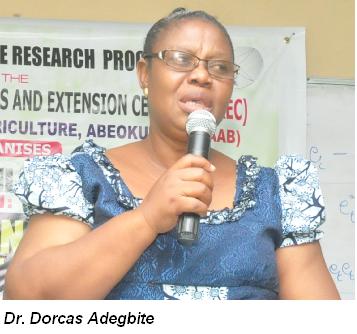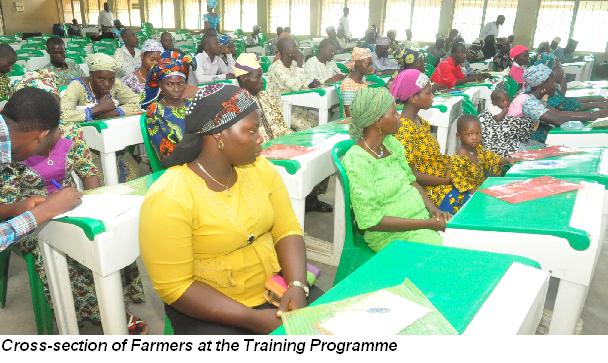It has been ascertained that despite the remarkable progress being made in increasing food production at the global level, approximately half of the population in the developing countries, do not have access to adequate food supplies which arise mainly from food losses that occur in the post-harvest and marketing system. This position emanated from the just-concluded “Capacity-Building Training on Prevention of Post-Harvest Losses”, organised by the Extension and Adaptive Research Programme of the Agricultural Media Resources and Extension Centre (AMREC). Speaking at the occasion, the Vice-Chancellor, Professor Olusola Oyewole, said the theme of the programme, “Prevention of Post-harvest Losses”, was aimed at solving challenges facing our teeming farmers in Nigeria.
According to him, estimates of the post-harvest losses of food grains in the developing world from mishandling, spoilage, as well as pest infestation is as high as 25 percent, adding that one-quarter of what was produced never reached the consumer for whom it was grown. He stressed that the effort and money used in producing were lost forever.
The Vice-Chancellor, who was represented by Leader, Planning Monitoring and Evaluation Programme for AMREC, Dr. Dorcas Adegbite, stated that fruits, vegetables and root crops were sensitive, noting that they perished quickly. According to him, “If care is not taken in their harvesting, handling and transportation, they would soon decay and become unfit for human consumption”. He added that “estimates of production losses in developing countries are hard to judge, but some authorities put losses of sweet potatoes, plantain, tomatoes, bananas and citrus fruit sometimes as high as 50 percent or half of what is grown”. He however stated that if portions of the lost product could be preserved and used by consumers, food supply would increase, noting that resources would be preserved, with corresponding potential gains for smallholder farmers in developing nations. Professor Oyewole who is also the President of Association of African Universities (AAU), stressed that post-harvest loss prevention offered an important opportunity to advance world food security now and in the future.
Lamenting the complexity of the menace which its prevention required innovations in measuring the extent of loss, developing appropriate technologies, integrating systems, evaluating policy, as well as effective dissemination of information, the Vice-Chancellor stated that governments, private sector and civil society need to cooperate towards finding a lasting solution to it. His words: “on our part as a University of Agriculture, efforts are being intensified to advance big ideas through research and innovation as well as dissemination of proven technologies on prevention of post-harvest losses which is the basic reason for which we are here today”. According to him, “I want all the participants to know that mastering the art of preventing and minimising post-harvest loss is one of the major avenues for boosting our economy because it can have a leverage effect for farmers’ income as well as for other supply chain operators.
Delivering the first paper titled, “Prevention of Post-Harvest Losses: Roots and Tubers, Fruits and Vegetables”, Dr. (Mrs.) Olubukola Odeyemi stated that Postharvest handling activities starts from harvesting of crops, storage, processing, packaging, transportation and distribution, until it gets to the final consumers. She stressed that contributors to post-harvest losses are not limited to disease and oversupply, adding that greater post-harvest loss occured in developing countries like Nigeria due to non-availability of proper storage facilities. Others were inappropriate transportation, as well as improper handling methods. Dr. Odeyemi, however, noted the negative impact the losses had on food security for poor people on food quality and safety, as well as economic development and the environment.
In the second lecture titled, “Prevention of Postharvest Losses in Cereals and Legumes”, Dr. Clement Afolabi, disclosed the main causes of food losses in low-income countries, saying that they were connected to financial management, as well as technical limitation in harvesting, storage and processing techniques. Dr. Afolabi said that storage facilities could not conquer the problems alone, adding that processing facilities should be established across the country so as to add value to agricultural products for local consumption and export, as well as mop up excess farm produce.
While delivering the third paper titled, “Preservation and Value-Addition to Food Crops: Roots and Tubers; Grains; Fruits and Vegetables”, Mrs. Adebukola Omidiran, described preservation as the extension of the shelf life of a perishable food. According to her, “It is the conversion of perishable food into more permanent forms through processing, treatment with chemicals, dehydration and sterilisation by heat”. She listed the techniques of food preservation as traditional, non-thermal, thermal processing, cold storage and freezing. Others are Dehydration/Drying and Fermentation. Earlier, the Director of AMREC, Professor Carolyn Afolami stated that farming has now become a lucrative business as farmers have been dressing corporately, driving exotic cars and living in posh residences. Represented by Dr. Jacob Olaoye, the Director said that the capacity building was timely as participants were expected to benefit immensely from the training programme.
